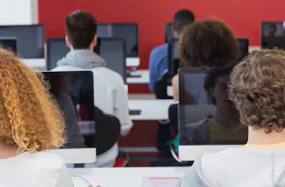This test should take around 16-18 minutes.
[Note: You will take the test with another candidate. During the test, you will be allowed to take notes to prepare your answers. The examiner will not mark your notes, only your speaking and listening skills are marked.]
Examiner: Hello Emily, hello Jacob. My name is Martin and I will be your examiner today. Let’s begin…
Phase 1a (4–5 minutes)
[The Examiner will select questions from those provided in the test pack, in a variety of areas such as name, nationality, work/study, where candidates live, and free time activities.]
Name:
Q. Could you tell me your full name, please?
Q. Do you like your name? (Why/why not?)
Nationality/where candidates live:
Q. Where is your hometown?
Q. How can you go there from here?
Work/study:
Q. What do you do?
Q. What are you studying now? (if you say that you are a student)
Q. Where do you work? (if you say that you are working)
Q. What do you like about studying? or, What do you like about your job?
Q. Do you enjoy your study/work? [Why/Why not?]
Phase 1b (5 minutes)
Examiner: Now I’d like you to ask each other some questions.
Emily, I’d like you to ask Jacob about the things he reads.
Jacob, I’d like you to ask Emily about how she learns English.
Now think about the questions you want to ask. You have one and a half minutes. You can write down your questions if you want to. If you don’t understand, please ask me.
[Note: You should write down 3-4 questions that you are going to ask. You should also think about what the other candidate might ask you.]
🕑 One and a half minutes for preparation…
Examiner: Emily, are you ready? Please ask Jacob your questions.
Examiner: Thank you.
🕑 Two minutes…
Examiner: Jacob, are you ready? Please ask Emily your questions.
🕑 Two minutes…
Examiner: Thank you.
Phase 2a (4 minutes)
Examiner: In this part of the test, you are going to listen to two recordings and answer some questions. You can make notes if you want to.
You hear two teachers giving some information to a class. What is the information about? An international party, a computer class or a book sale?
Play the Recording:
[You will listen to the recording only once.] Audio Copyright – Cambridge IELTS
What is the information about?



Examiner: Emily, what is the first recording about? An international party, a computer class, or a book sale?
Emily: ………………..
Examiner: Thank you.
Examiner: Jacob, what is the second recording about? An international party, a computer class, or a book sale?
Jacob: ………………..
Examiner: Thank you.
Now listen again, and answer these questions.
Examiner: Jacob, in the first recording, what time does the book sale start? And how much does a coursebook cost?
Jacob: …………
Examiner: Emily, in the second recording, what time does the party begin? And what will teachers take to the party?
Emily: …………
Phase 2b (3-4 minutes)
Examiner: Now you’re going to talk together about parties and festivals. Talk to each other about parties and festivals you enjoy.
[The examiner might prompt candidates with questions from the box below if they are experiencing difficulty in continuing the interaction or if they stray from the topic. He/she may also encourage candidates’ interaction by eliciting agreement or alternative opinions from candidates by asking questions such as “What do you think?”, “Tell us what you think.”, “And you?”]
Parties and Festivals – prompt questions
Q. Do you like going to parties? (Why?/Why not?)
Q. What do you do on your birthday?
Q. Is there an important festival in your country? (Tell us about it.)
Q. What food do you eat at a party or festival?
Examiner: Thank you. That is the end of the test.
Answer Section:
Phase 1a:
Name:
Q. Could you tell me your full name, please?
Answer 1: Sure, my full name is Emilia Palmer. You can, however, call me Emily.
Answer 2: My name is Jacob Gibb. Everyone calls me “Jacob” while “Gibb” is my surname.
Q. Do you like your name? (Why/why not?)
Answer: They say, “What’s in a name?” for a reason as there is nothing so special about having a name other than it is used primarily to identify a person. However, I like my name because it carries some “nice meaning”. I like my name also because it carries some good memories with it, as it was chosen by my parents and my grandfather.
Nationality/where candidates live:
Q. Where is your hometown?
Answer: I live in one of the Melbourne suburbs, called “Carlton”, which is very lively and well-known for its Italian café and restaurants along with some beautiful gardens and parks. Carlton is only about a mile from the city of Melbourne.
Q. How can you go there from here?
Answer: Carlton is only about a couple of kilometres from my current location which is Melbourne downtown. I can either drive my car to reach my home, or I can also take the Melbourne metro train system at Flinders Street Station in the city to arrive in my hometown. But, I prefer to walk because I love walking whenever I get an opportunity. It will take me only about 20-25 minutes to reach there on foot.
Work/study:
Q. What do you do?
Answer 1: [for a studnet]
I am a final year postgraduate student at one of the premier Australian universities in Melbourne, and I also take part in some extracurricular activities such as debating, community services and writing in the student newspaper. [for a studnet]
Answer 2: [for a job holder]
I am a Senior Manager at “Seagate Manufacturer”, and I oversee the daily tasks and activities of a group of talented junior executives involved in preparing monthly sales forecast for my manufacturing company. I have been working in this company for the last two years and I have 4 years’ job experience in total.
Q. What are you studying now? (if you say that you are a student)
Answer: I am doing my MBA in Human Resource Management at “Monash University” in Melbourne. I am in my third semester.
Q. Where do you work? (if you say that you are working)
Answer: I work at one of the leading computer hardware manufacturing companies in Australia which is located in the industrial zone of Melbourne West. The name of this company is “Seagate Manufacturer”.
Q. What do you like about studying? (if you say that you are a student)
Answer: What I really like about studying is that it allows me to question about things and find their answers in a way that satisfies my curious mind. Besides, “studying” probably is the only “companion” in this world which gives us the best thing (knowledge), and yet never asks anything in return. I love my university and the teachers are brilliant. I am constantly learning and that’s the best part of my studies.
Q. What do you like about your job? (if you say that you have a job)
Answer: What I really like about my job is that it is never dull or boring since I always get to talk with a bunch of very talented people who almost always is coming up with new ideas on how to improve the sales of our company. Besides, I like to be in a job that is related to my education and skills. I feel like I am doing something important.
Q. Do you enjoy your study? [Why/Why not?] (if you say that you are a student)
Answer: Yes, I do enjoy my studies since it allows me to understand the most important resource of a company, which is its “employees”, both on a personal and professional level so that I can get the best out of them in order to benefit not only the associated company or institution but also the society at large. I also learn new things almost every single day and that’s the best part of my studies. Finally, I love the friendly and talented teachers we have in our university who are not only great mentors but also truly inspiring.
Q. Do you enjoy your work? [Why/Why not?] (if you say that you do a job)
Answer: What I really like about my job is that my Senior Managers there respect my opinions and make me feel like I am an important asset for my company as I always try to deliver the best for it. Another thing that I really like about my job is that we always try to cooperate among our fellow employees which make our lives a lot easier at work than it really is supposed to be. Since I feel that I am doing something important, I enjoy my work.
Phase 1b:
Q. Examiner: Now I’d like you to ask each other some questions.
Emily, I’d like you to ask Jacob about the things he reads.
Jacob, I’d like you to ask Emily about how she learns English.
Things he reads:
1. Do you like reading, Jacob?
2. Do you usually read for leisure or for study/work purposes?
3. What types of books do you like to read? [Why?]
4. How often do you read a magazine?
5. Jacob, can you tell me about a book or novel you have read more than once? [Why]
How does she learn English?
1. How long have you been learning English, Emily?
2. Which learning method does work best for you?
3. Do you think watching movies and listening to music can help us learn English? [How?]
4. How a mentor or a teacher can help us learn English? Do you have one?
5. How long do you read every day? [Why?]
Phase 2a:
Q. Examiner: Emily, what is the first recording about? An international party, a computer class, or a book sale?
Answer: a book sale.
Q. Examiner: Jacob, what is the second recording about? An international party, a computer class, or a book sale?
Answer: an international party.
Q. Examiner: Jacob, in the first recording, what time does the book sale start? And how much does a coursebook cost?
Answer: 11.00 (this morning/in the morning), £7.50.
Q. Examiner: Emily, in the second recording, what time does the party begin? And what will teachers take to the party?
Answer: 7 o’clock, (music) CDs (from different countries).
📻 Listening script 1:
Now… Could you listen for one minute! I just want to tell you all that you can buy dictionaries and other books during break from 11 o’clock this morning. All the English coursebooks are half price so you can get them now for £7.50. So, the sale’s in room B3…
📻 Listening script 2:
Hello everyone… before we start, I want to tell you about the international evening next Tuesday. Remember, the party starts at 7 o’clock. The teachers will bring some music CDs from different countries. We hope you can all come!
Phase 2b:
Parties and Festivals – prompt questions
Q. Do you like going to parties? (Why?/Why not?)
Answer: I like going to parties, depending on, of course, who are there. I basically “party” with my close friends every other weekend to relax a little and have a good time outside of my family and work life. But I just don’t really like going to a wild party with too many people, rampant drinking, and really loud music in it. Of course, I like meeting new people, but, sometimes the loud music together with loud noises of human voice just make it too difficult to have a conversation.
Q. What do you do on your birthday?
Answer: Well, I really, really like my birthday party though because this is where I get to be the “centre” of attention. When I have a birthday party, I just call some of my close friends and relatives, along with my family members, and cut a big chocolate cake while the other participants wishing a “happy birthday” to me. And, once the cake eating part and having soft drinks are finished, I am pretty much done with my birthday party, which can typically last from one hour to two hours at max. I do not like the idea of celebrating my birthday too elaborately unlike my childhood when I wanted a grand party for every birthday of mine!
Q. Is there an important festival in your country? (Tell us about it.)
Answer: There are many festivals in Australia, but the one which, I think, is important is “Australia Day”, which is celebrated on 26th of January every year, in order to commemorate the anniversary of the arrival of Captain Arthur Phillip and 11 other ships of “British convicts” to New South Wales, which essentially gave birth to a new country called “Australia” on the world map. We enjoy this day with great fervour and commemorate it with elevated passion.
On “Australia Day” day, every year, Australians come together with families and friends for the purpose of celebrating the birthday of their great country by having barbeque meals and setting off fireworks.
Q. What food do you eat at a party or festival?
Answer: Whether we are enjoying just a regular “party” or a festival, we Australians like to eat sausages, burgers, steak and fresh seafood and some salads (occasionally) together with bread, tomato and barbecue sauce, but it’s mainly the meat and fish that we eat.
Examiner: Thank you. That is the end of the test.
[That is the end of the answer section.]

Thanks for detailed questions and answers examples. This would really help while preparing for IELTS exams. Thanks again.